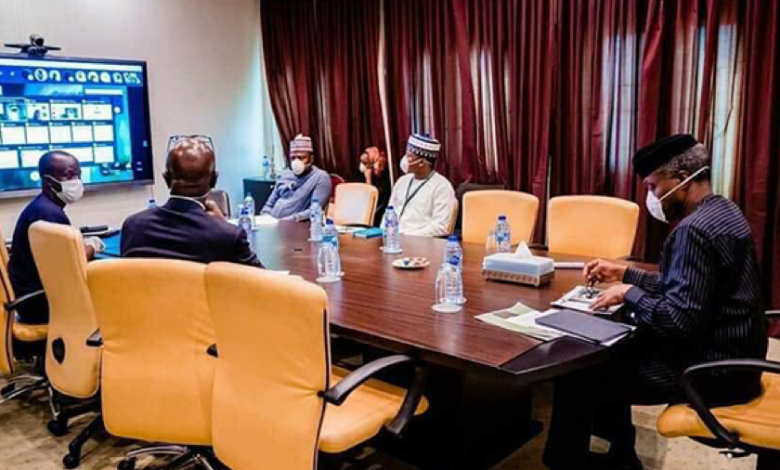Why Wearing Masks, Gloves May Not Protect Against COVID-19
“Medical masks cannot protect against the new coronavirus when used alone. When you wear them, you must combine them with hand hygiene and other preventive measures. WHO only recommends the use of masks in specific cases.”

When Gbemisola Adebowale travelled to her town on March 24, she spared no efforts in protecting herself from the ravaging forays of COVID-19. “It’s almost as if I was dressed for war,” she said about her preparation. She had on hand gloves, face masks, as well as a pair of glasses, and was determined to commence self-isolation as soon as she arrived home.
Evidently, the demand for these protective personal wares has shot through the roof. As a result, the prices of the items have as well shot up radically. In spite of the rush by the members of the public to purchase these wares, there is a suggestion by experts that these presumed protective wares cannot protect in the real sense.
Use masks only in specific cases ― WHO
The World Health Organization has recommended, with respect to COVID-19, that masks should not be used indiscriminately.
“Medical masks cannot protect against the new coronavirus when used alone. When you wear them, you must combine them with hand hygiene and other preventive measures. WHO only recommends the use of masks in specific cases,” Christine Francis, a consultant for WHO on infection prevention and control has advised.
These cases include when a person has a cough, fever, or difficulty breathing. Without these symptoms, the mask is not necessary “because there is no evidence that they protect people who are not sick”.
A healthy person who is taking care of or interacting with someone who may have been infected with the virus is also advised to wear a mask whenever they share the same room with them.
It is not just that wearing masks is unnecessary for most people, WHO has, in fact, cautioned that wearing them can prove counterproductive.
“Masks alone can give you a false feeling of protection and can even be a source of infection when not used correctly,” noted Dr April Baller of the organisation’s Health Emergencies Programme.
WHO’s emergencies director, Mike Ryan, emphasised that the most important form of protection from COVID-19 remains constant hand-washing, keeping hands away from the face, as well as “very precise hygiene”.
But why do healthcare providers and sick people need to use them? According to Dr Baller, “because healthcare workers and caretakers are in close contact with ill individuals, so they are at higher risk of catching COVID-19 and sick people [in order] to protect others from small droplets that can come out when they cough or sneeze”.
If anyone would be using masks at all, it is advised, that they should make sure they clean their hands before and after wearing them, make sure they are tight-fitting, avoid touching them during use, avoid reusing, remove them carefully from behind after use, and discard properly in a closed bin.
The same goes for gloves
Just as facemasks give a false feeling of safety, people who make use of gloves have been found not to wash their hands frequently while touching their masks or face often, which may backfire. Viruses stick to gloves just as much if not better than they stick to hands, according to respirologist Dr Samir Gupta, who suggests that people should rather assume they are wearing new gloves each time they wash their hands.
Gloves aren’t supposed to be worn by the general public, Dr Amesh Adalja, a senior scholar at the Johns Hopkins Center for Health Security, has said, describing the practice as time-wasting and unnecessary.
“Latex gloves can rip very easily,” Adajla explained. “They’re not designed for going out, running upstairs, doing things in daily life. They’re not very durable when it comes to pumping gas or anything … They’re going to get holes. They’re not meant for wearing during activities and daily living. Even as a physician, I have my gloves rip all the time.”
“Gloves are not a substitute for washing your hands,” she stressed during a separate interview with AFP. The same position was taken by Lindsay Broadbent, a virologist at Queen’s University Belfast, among other experts.
Besides, if just anybody is putting on masks and gloves, there won’t be enough for healthcare professionals and infected people to use. WHO’s estimate is that health workers will need a minimum of 89 million masks every month to attend to COVID-19-related cases. Shortages are already being recorded in various countries including Nigeria where there is the added problem of price-hiking.
Not as simple as it appears
WHO’s recommendation nonetheless, some scientists have argued there is a benefit in the wearing of masks by the general population. David Hui, a respiratory medicine expert at the Chinese University of Hong, for instance, described it as “common sense” that face masks can protect people against infectious diseases. This is because they provide “a barrier from respiratory droplets, which is predominantly how the virus spreads”.
Wearing masks also prevents infected persons who are showing no symptoms from spreading the virus to others.
The lack of solid evidence to support the effectiveness of masks is understandable, Hui said, because of the risks of experimenting. “You can’t randomize people to not wear a mask, and some to wear a mask, and then expose them all to the virus,” he explained.
But two things are certain: Healthcare workers have a greater need for gloves and masks and if others will be putting them on, their level of safety depends a lot on how much caution is exercised.
Support Our Journalism
There are millions of ordinary people affected by conflict in Africa whose stories are missing in the mainstream media. HumAngle is determined to tell those challenging and under-reported stories, hoping that the people impacted by these conflicts will find the safety and security they deserve.
To ensure that we continue to provide public service coverage, we have a small favour to ask you. We want you to be part of our journalistic endeavour by contributing a token to us.
Your donation will further promote a robust, free, and independent media.
Donate Here




